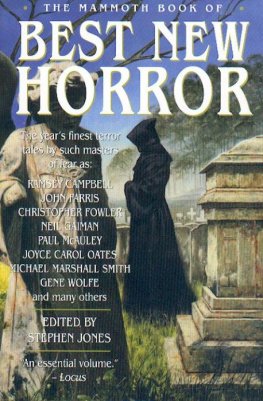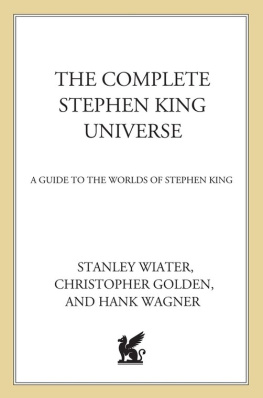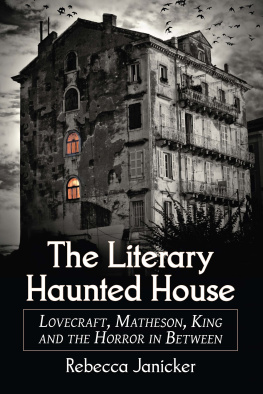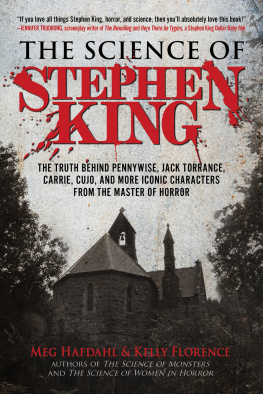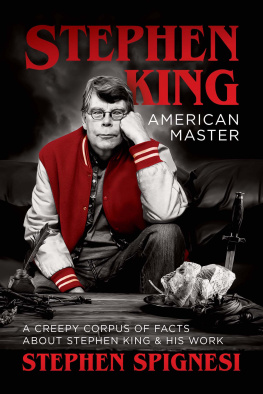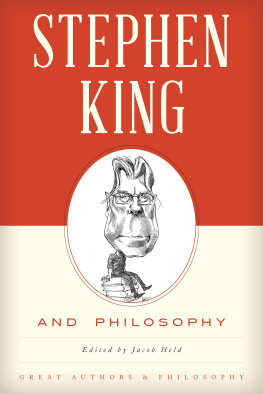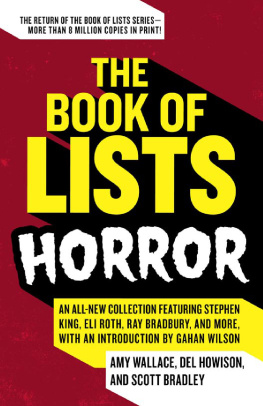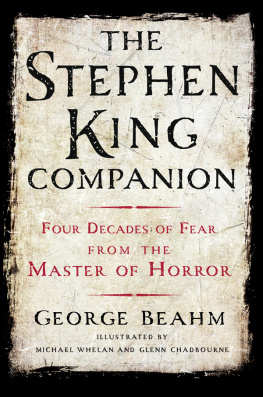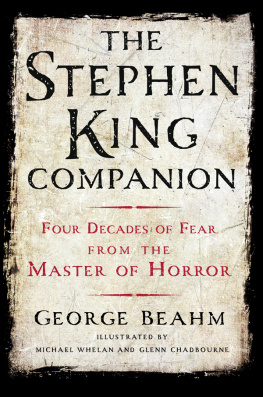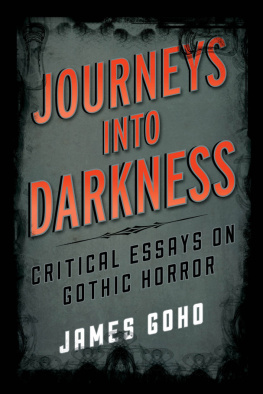The Linguistics of Stephen King
Layered Language and Meaning in the Fiction
James Arthur Anderson

McFarland & Company, Inc., Publishers
Jefferson, North Carolina
LIBRARY OF CONGRESS CATALOGUING DATA ARE AVAILABLE
BRITISH LIBRARY CATALOGUING DATA ARE AVAILABLE
e-ISBN: 978-1-4766-2952-0
2017 James Arthur Anderson. All rights reserved
No part of this book may be reproduced or transmitted in any form or by any means, electronic or mechanical, including photocopying or recording, or by any information storage and retrieval system, without permission in writing from the publisher.
Front cover image by Anat Sukeewong (iStock)
McFarland & Company, Inc., Publishers
Box 611, Jefferson, North Carolina 28640
www.mcfarlandpub.com
To Lynn Llorye
Acknowledgments
When I first began this project, I had no idea of the enormity of the task ahead of me. First, I would like to thank my wife Lynn Llorye Anderson for her patience and understanding, while I hunched over the computer on so many long nights, and for her willingness to read the manuscript and make helpful suggestions.
Id also like to thank David Biderman, one of my Stephen King fan friends, for reading my early draft and sharing his insights with me.
Thanks to the Horror Writers Association for awarding me a Rocky Wood Memorial Scholarship for Nonfiction grant that helped me obtain some of the resources that I needed and to my colleagues at Johnson & Wales University, North Miami Campus, who have given me the encouragement that Ive needed, not to mention access to databases and resources that were so important in compiling my research.
I would also extend a sincere thanks to Stephen King for writing fiction that is interesting and complex enough to withstand this kind of an analysis (I know youre not a fan of scholars, but I hope you read this book and find some value in it).
I also thank those who have come before me in Stephen King criticism, particularly Michael Collings and Anthony Magistrale, who have paved the way. I am also indebted to my peer reviewers, who provided valuable feedback.
Preface
When I first discovered Stephen Kings fiction, I was working in a factory on an assembly line in Providence, Rhode Island. Armed with my brand new bachelors degree from Rhode Island College (and unable find work as an English major), I had reached overload with the classics and was now reading whatever junk and genre fiction I could lay my hands on and trying to perfect the craft of writing short stories so I could escape from my job in what I un-fondly called the hellhole. So at the time, I was particularly attracted to reading genre short stories, so I could figure out how it was done, so to speak. Thats when I ran into The Mangler, a particularly nasty short story collected in Kings Night Shift anthology.
For those of you who may not remember this early story as vividly as I do, The Mangler is about a vindictive machine that comes to life in an industrial laundry, mangling and shredding anyone it can get its gears into. While noted horror fiction critic S.T. Joshi has said of the machine if one can imagine it (64), my suspicion is that, with all due respect, Joshi has never had the misfortune to work in an environment with machinery that could maim and kill. I did; this was my kind of story. It spoke to me, since, at the time, I was working for an unscrupulous factory that would remove any of the OSHA mandated safety guards to speed up production whenever it thought it could get away with doing so. These machines, quite frankly, frightened me more than any ghost, goblin, or Lovecraft creation ever had. Sure, I admired Lovecrafts elaborate prose (I went on to write my Ph.D. dissertation on himand Joshi, whom I do admire, was gracious enough to write a very flattering foreword for it when it was eventually published in book form). I admired Harlan Ellisons way of brilliantly turning a phrase and I just couldnt get enough of Bradbury, whose work I would write my M.A. thesis about ten years later. But this story, The Mangler, as flawed and unbelievable as it might bewell, it described me and my world, and it fictionalized the real nightmares that I had almost every night.
Now, mind you, never in a million years did I ever think Id be writing a critical study on Stephen King decades later, let alone have it see publication, and use words and theories that were well beyond the limits of an undergraduate degree in English. I hoped, at best, I would be able to publish some short stories and maybe a novel or two (a goal that I did ultimately reach, but I still am not about to give up the day job, where I am fortunate enough to teach what I love at a respected university and get paid rather well for it). I didnt expect to ever go to graduate school and learn about things like hermeneutic code and metafiction, and I surely never expected that anyone would be writing critical studies of Stephen King, least of all me.
But here I am, armed with all of the critical theory I could find from nearly ten years of graduate school, not to mention decades of continuing education, including self-taught courses in linguisticsin order to keep my job, get promoted to a professorship, and be able to write this study.
So why did I write this book? I now hold the rank of full professor and could sit on my laurels, so to speak, until I retire in five to seven years. And this book was difficult to write, a three-year adventure requiring lots more reading and research than my masters thesis and Ph.D. dissertation put together. I wrote this because most of the fan writing, while good, doesnt have the backing of the academy. Although it is changing quickly, most of the early King critics lacked the academic credentials and expertise in literary theory that is required to write studies that would help one be granted tenure. There are, of course, notable exceptions (Magistrale and Collings come immediately to mind), and scholars are now publishing dissertations and scholarly articles and presenting papers at academic conferences. Ive enjoyed all of Stephen Kings bookseven the bad ones, like The Tommyknockersbut I always wondered how his fiction would hold up under the magnifying glass (probably more like the microscope) of critical theory. Rather than use subjective criticism of what is good or bad, I wanted to just take the fiction and run it through a more scientific process and see what came of it. And thats how this book was born. Ive used a number of different critical approaches in my attempt to pull meaning out of Kings books. I began with a linguistic study, since so many of Kings stories are about authors and writing, but as I went along I found myself using other theories as well: structuralism, deconstructionism, Marxism, and whatever I could pull from my tool box that seemed appropriate to the particular work under analysis.
Obviously, I could not write an analysis of every story or novel that Stephen King wrotehe writes books faster that I can write the criticism of them. Such an attempt would be too long for any publisher to print. So, for the most part, I chose stories from the canon that best illustrated the writing and language theme in his works. Although the Gunslinger series is intensely metafictional, and, according to King himself, is heavily concerned with writing and the creative arts, I decided not to include it as an extensive study, because it would have turned into a complete book of its own. Finally, I must admit, I chose some stories just because they were my favorites.


